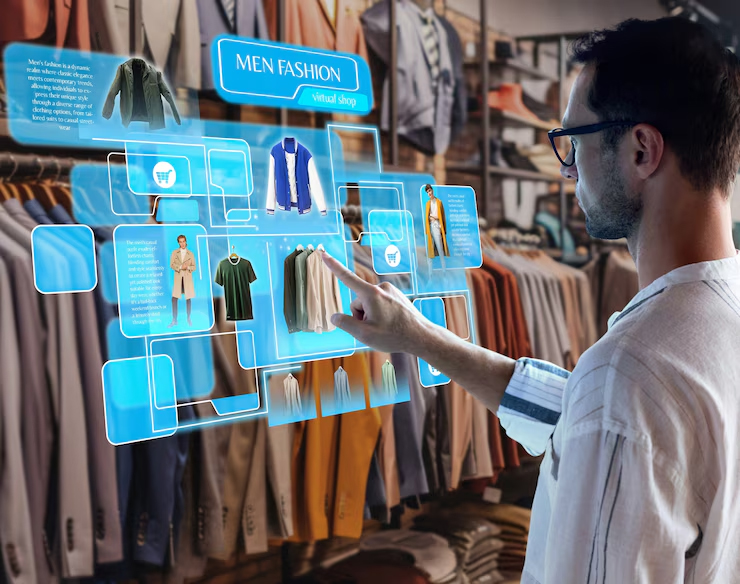The Rise of AI in eCommerce
AI adoption in eCommerce is revolutionizing business operations and customer engagement. Currently, 51% of eCommerce companies use AI; AI-enabled solutions are predicted to reach USD 16.8 billion by 2030.
By 2024, 40% of eCommerce businesses will use AI, boosting sales by 30% through personalized shopping and efficient operations. Machine learning algorithms are employed to forecast buying patterns, optimize inventory, and create impactful marketing campaigns.
Retailers Utilizing AI for their eCommerce stores
Zara
Zara utilizes AI to optimize its supply chain and inventory management. The retailer uses machine learning algorithms to predict fashion trends and ensure that popular items are always in stock. Zara’s AI systems also help in managing logistics and reducing delivery times.
H&M
H&M has implemented AI to enhance its eCommerce operations. The retailer uses AI to analyze customer data and provide personalized shopping recommendations. H&M also employs AI for inventory management, ensuring that the right products are stocked in the right locations.
Alibaba
Alibaba uses AI extensively across its eCommerce platforms. The company employs AI for personalized product recommendations, customer service through chatbots, and efficient supply chain management. Alibaba’s AI systems also help in detecting fraudulent activities and ensuring secure transactions.
ASOS
ASOS leverages AI to personalize the shopping experience for its customers. The retailer uses AI to recommend products based on customer preferences and browsing history. ASOS also employs AI for visual search, allowing customers to find products by uploading images.
Target
Target uses AI to enhance various aspects of its eCommerce operations. The retailer employs AI for personalized product recommendations, efficient inventory management, and optimized supply chain logistics. Target’s AI-driven chatbots also assist customers with their inquiries, providing a seamless shopping experience.
The Future Landscape of AI in eCommerce
As we peer into the future of AI in eCommerce, the outlook is extraordinarily bright. Indeed, emerging technologies are expected to revolutionize how online businesses function and connect with customers. Moreover, several dominant trends will drive this transformation, thereby ushering in a new era of innovation and efficiency in the eCommerce sector.
The Role of Advanced Machine Learning and Deep Learning in eCommerce
Advanced machine learning and deep learning are poised to significantly enhance personalization in eCommerce. These technologies transcend basic product recommendations, managing entire customer journeys. They predict individual needs and craft experiences based on personal preferences and past behaviors. This deep level of personalization will enable eCommerce platforms to provide more relevant and engaging shopping experiences, increasing customer satisfaction and loyalty.
Voice and Visual Search Enhancements
AI-powered devices like smart speakers are making voice search popular, prompting eCommerce businesses to update their SEO strategies. Advancements in visual search enable customers to find products with images, simplifying shopping and increasing engagement and purchases.
Augmented Reality (AR) Shopping
Augmented Reality (AR) powered by AI is poised to revolutionize the online shopping experience by enabling customers to visualize products within their own environment before making a purchase. This cutting-edge technology allows shoppers to virtually place items, such as furniture, in their homes or see how clothing and accessories would look on them. This interactive experience enhances buyer confidence, boosts conversion rates, and reduces returns by enabling well-informed purchasing decisions. Incorporating AR into eCommerce platforms enhances the shopping experience, leading to stronger customer loyalty and retention.
AI-Driven Logistics and Supply Chain Management
AI is set to revolutionize logistics and supply chain management by automating key decisions, from inventory control to delivery logistics, ensuring faster and more cost-effective operations. AI technologies enable businesses to optimize their supply chains through real-time data analysis and automated decision-making. Predictive analytics will play a critical role in forecasting demand and optimizing stock levels, thereby minimizing waste and reducing the risk of shortages. Additionally, AI can enhance route planning and delivery schedules, improving efficiency and customer satisfaction. By quickly adapting to market changes, AI-driven systems provide a more resilient and agile supply chain, essential for maintaining competitiveness in a dynamic market environment.
AI enhanced Shopping Stores
AI will play a crucial role in helping brands meet the growing consumer demand for sustainability. By leveraging advanced data analysis, companies can optimize their environmental impact by reducing overproduction and improving supply chain efficiency. AI technologies allow businesses to monitor and analyze each stage of production and distribution, pinpointing opportunities to minimize waste and use resources more effectively. Furthermore, AI can assist in creating eco-friendly packaging and promoting sustainable sourcing practices, further lowering the environmental footprint. Through the use of AI, brands can not only fulfill the sustainability expectations of today’s consumers but also foster a more sustainable future, enhancing their market reputation and customer loyalty.
Strengthening eCommerce with AI-Driven Security
As the eCommerce sector grows, so does the threat of cyber attacks. AI will be essential in bolstering security measures by using pattern recognition and anomaly detection to prevent fraud and safeguard customer data. Integrating AI into e-commerce platforms is about more than technological progression; it’s about creating a safer, more intuitive, and efficient shopping experience that aligns with consumers’ evolving expectations. The collaboration between AI and eCommerce will result in a more connected and data-driven market, enhancing both security and user experience as we progress.
AI Enhancing Cybersecurity in Online Shopping
With the expansion of eCommerce, the risk of cyber threats also escalates. AI will be vital in enhancing cybersecurity protocols, employing pattern recognition and anomaly detection to prevent fraud and protect customer information. The ongoing integration of AI into e-commerce platforms is more than just a technological leap; it’s about establishing a secure, efficient, and user-friendly shopping environment that meets the changing needs of consumers. As AI and eCommerce continue to converge, they will create a more connected and data-centric market, improving security and overall consumer satisfaction.
Read More, How You Can Leverage AI Model Development For Your Business?
Embracing AI for eCommerce Transformation
The integration of AI by eCommerce giants has revolutionized how businesses operate and engage with customers. As a result, these companies have leveraged AI to enhance personalized shopping experiences, streamline operational processes, and optimize supply chains, thereby setting new industry standards.
The future of AI in eCommerce holds even more promise, with innovations in machine learning, augmented reality, and cybersecurity poised to further transform the shopping experience. For businesses aiming to stay ahead in this rapidly changing landscape, adopting AI technologies is crucial.
At Ibiixo Technologies, we harness the latest AI innovations to help businesses transform their eCommerce operations. Whether you’re looking to enhance customer experiences, improve operational efficiency, or secure your transactions, our expert team can deliver customized AI solutions tailored to your needs.



